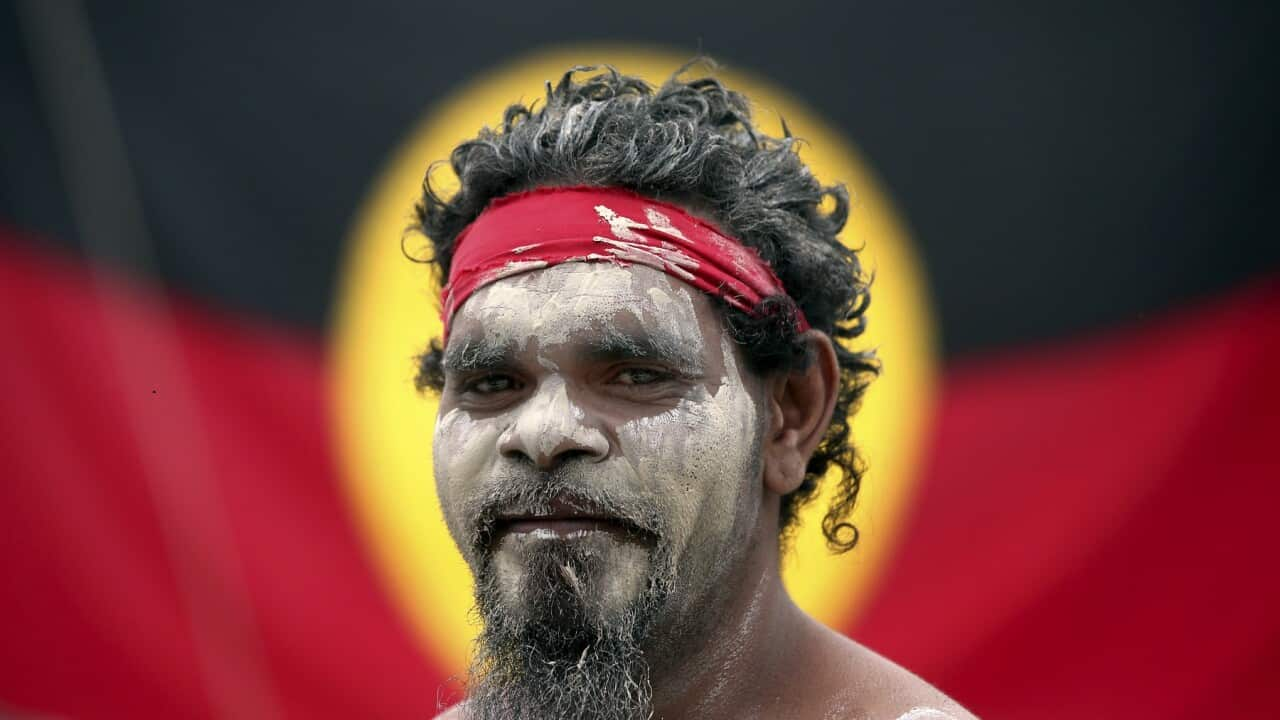TRANSCRIPT
January 26 was made the national 'Australia Day' public holiday in 1994.
It was on this same date in 1788, that the First Fleet established a convict settlement at Sydney Cove, marking the beginning of European Colonisation of Australia.
And it's a day of great pain and mourning for many Aboriginal and Torres Strait Islander people.
The decades of colonial violence, dispossession and trauma inflicted on First Nations people since this date have led many to call for Australia's national day of celebration to be changed.
NITV Radio spoke to representatives from local councils, Aboriginal Corporations and community organisations about changing the date, as well as local efforts to acknowledge the pain and trauma associated with January 26.
Sarah Jane Hall is Co-Chair of Ballarat's Koori Engagement Action Group, and she says there is significant support for the date to be changed in the Ballarat community.
“There's a strong groundswell here in community both Indigenous and non-Indigenous community. It must be noted that not all First Nations people feel the need to change the date, but with the different community events that we've hosted in Ballarat for people to come and have their voice heard, by far the overwhelming support is for Australia Day to be celebrated on another day throughout the year.”
And CEO of Bendigo Aboriginal Corporation Dallas Widdicombe says a change of date is just a matter of time.
“ There is so much momentum. We're seeing it over the years... It's gonna happen. To my people out there bear with us. It'll take more advocacy, but it will happen, the date will change. And hopefully it's one we can celebrate together as a nation.”
Some local councils have sent a clear a message through deciding not to recognise January 26 as a day of celebration.
In inner north Melbourne, Meri-Bek Council Mayor Angelica Panopolous says councillors formally decided to recognise the date as a day of mourning rather than celebration in 2017.
“Back then, you know, the majority of councillors decided that January 26 is not a day to celebrate. It's not an inclusive or unifying holiday for people. It's, you know, it's a day of deep loss and trauma for First Nations people and that's what they were consistently being told. And so this was about, like listening to them. And I guess not, yeah, not celebrating a day that is so harmful for so many people.”
For Independent Senator Lidia Thorpe, the idea of changing the date alone is not enough.
She says without a truth-telling process that adequately acknowledges Australia's violent colonial history and its ongoing impacts on First Nations people, a date change would risk being tokenistic.
“If you change the date to whatever other day, you're just moving the problem to that date. So we need to have a truth telling journey and a conversation around treaty so that we can all come up with a peace agreement on a day that means peace.”
Alongside calls for the date to be changed, many grass-roots organisations and local councils are finding ways to shift the focus of January 26.
In 2020, Ms Thorpe was a leading figure in establishing Anzac Day-style Dawn Services, which have since grown in popularity and have been taken up by various Local Government Areas.
Dawn Service events take place in the early hours of January 26 to acknowledge and pay respect to Indigenous people who died in Frontier wars and massacres, Indigenous soldiers who died in subsequent wars, those who were removed from their families as a part of the Stolen Generation, as well as those impacted by ongoing colonial violence.
Ms Thorpe says the kind of truth telling that occurs at these services creates an opportunity to recognise the mourning and pain this day represents for so many people.
“It really opened a space for people to come together and learn of the horrific injustices that continue to occur. But also take some of the pain by standing with us on a on a day that is so painful.”
For Mr Widdicombe, the Dawn Service held on January 26 in Bendigo offers a chance to reflect on his own family history, and the denial of equal treatment experienced by Indigenous soldiers.
“I also have a personal connection. My grandfather, who's still alive today, is a Vietnam vet. And he returned without settlements, like the mainstream people that fought for the country. So it's super important that we acknowledge our Aboriginal soldiers.”
A Survival Day Dawn Service has also been held each year in Ballarat since 2020.
Ms Hall says it offers an important opportunity for unity and solidarity on January 26.
“It's a great opportunity for people to come together. Aboriginal and Torres Strait Islanders, allies, non Indigenous people all to come together. It's a positive event. And it's where a time where we can stand in solidarity here about some of the history that has happened between government policies actions, Aboriginal and Torres Strait Islanders, the trauma that they experienced.”
She says it's about celebrating the resilience of Indigenous people and culture, and creating paths for healing.
“We acknowledge the determination and resilience and strength of those that have survived the traumas. I feel that there is much wisdom in uncle Jeffrey's words when he says, in the healing process we don't do the healing alone. We do it together. Only together can we heal because alone it carries great angst and it carries trauma. So when we do survival, when we do ceremony, when we do repatriation we do it together- Indigenous and non Indigenous together. We can comfort each other.”













